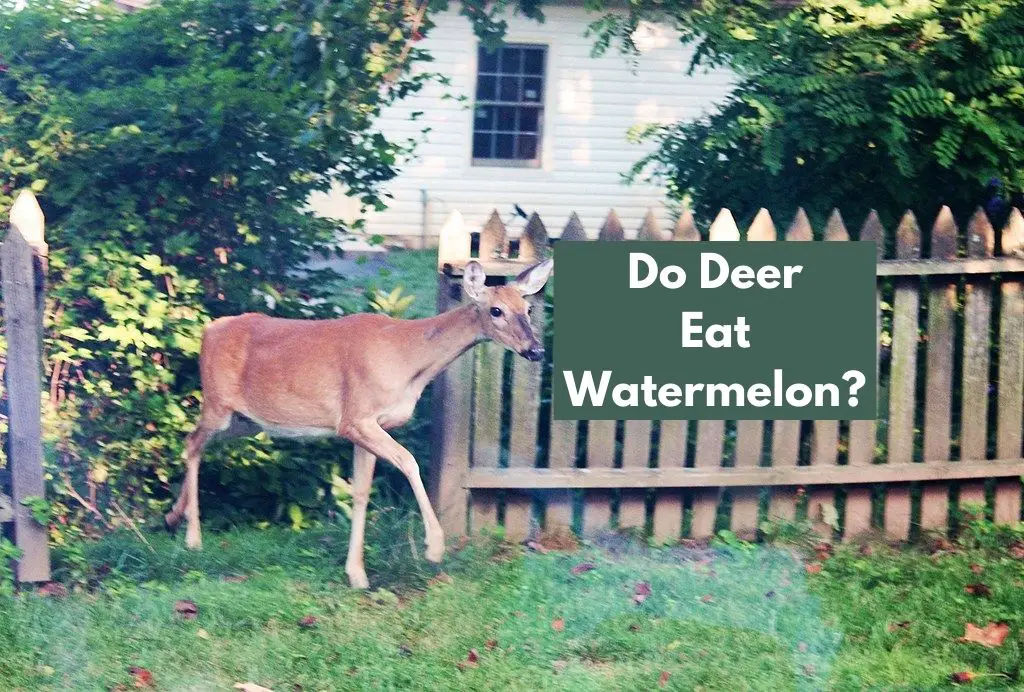There are a lot of myths out there about what deer do and do not eat. One common question is: do deer eat watermelon?
Yes, deer love watermelon. Deer will eat the fruits, leaves, stems, and vines of watermelon. Usually, deer will break watermelons open with their hooves and eat the flesh inside. Deer are attracted to watermelons because of their sweet taste.
There’s a bit more to learn about deer eating watermelon which we’ll cover in today’s guide. Read on for more info.
Why Do Deer Eat Watermelon?
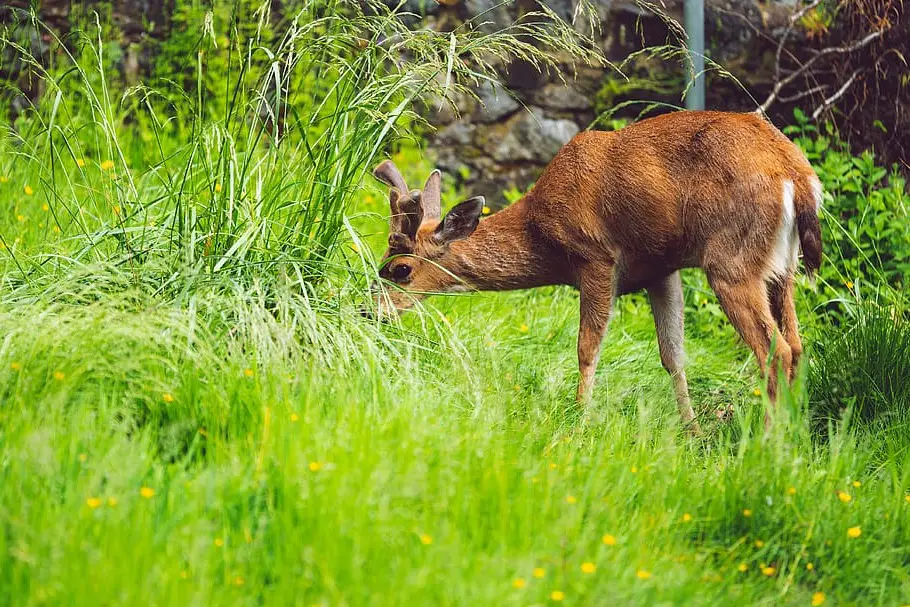
As we covered, deer will eat watermelon when they’ve got the chance.
They will gladly eat the entire watermelon plant (fruit, vine, stems, leaves, and all), as well as trample nearby watermelon plants while trying to chow down.
But why do they do this?
Well, for one, deer are browsing animals, meaning they’ll eat almost anything they come across if they’re hungry enough.
Second, they go crazy for sweet foods and leafy greens, and watermelons on the vine have it all.
Your watermelons are most susceptible to deer when there are fewer other food choices around for them, and especially when the watermelons are young and the plants are tender.
Additionally, deer will consume a wide variety of foods like watermelon based on opportunity.
Take a look at this deer making a meal out of a watermelon in a homeowner’s backyard:
If you’re not convinced, leave some watermelon out for deer to eat (or plant some), and wait to see what happens!
Are Watermelon Plants Deer Resistant?
No, watermelons are not deer resistant.
In fact, deer are attracted to watermelons because of the leafy, tender vines and sweet fruit they bear.
Do Deer Eat Watermelon Rinds?
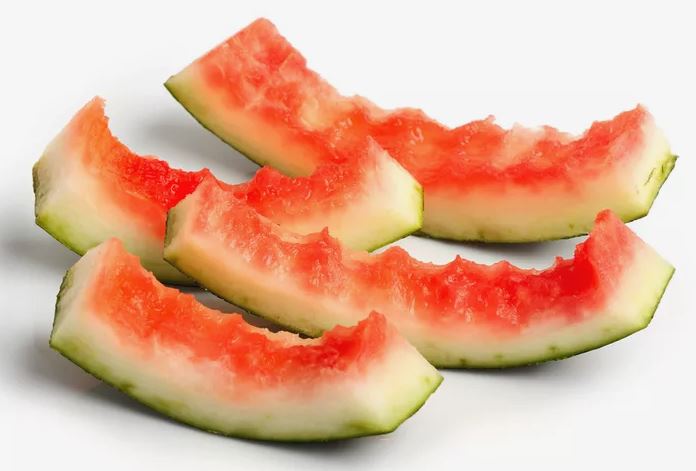
Deer have very strong jaws and teeth, designed to eat hard nuts and acorns, and the watermelon rinds are quite soft by comparison.
So yes, deer can eat watermelon rinds, although they’ll usually leave the rinds alone.
Even though a deer can eat watermelon rinds, it doesn’t mean they should.
A watermelon rind has hardly any nutrition and will be harder for deer to digest than many other foods, making it “wasted space” in their stomach.
That watermelon rind could’ve been replaced with a healthier food, and you don’t want to cause deer to become malnourished, so we advise against feeding watermelon rinds to deer.
If you leave watermelons out for deer to eat, you can leave the rinds on and they’ll usually just eat the fruit from inside and leave the rinds for you to clean up.
How Do I Keep Deer From Eating My Watermelons?
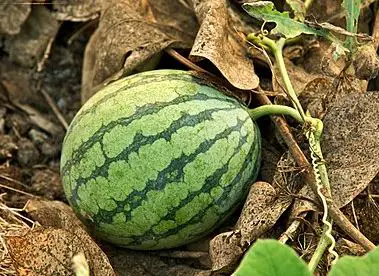
There are a few things to keep in mind when you’re protecting watermelons from hungry deer: their habits, your scent, repellent options, and when you plant them.
Deer will eat nearly anything if they’re hungry enough, so your main goal is making your garden as least inviting to deer as possible.
Check out our guide on how to keep deer from eating plants where we cover 25 quick and easy tips for keeping hungry deer out of your garden.
Will My Watermelon Grow Back After Deer Eat Them?
So a hungry deer snuck in your garden and had a feast on your watermelons. Will they grow back?
Watermelons are a tender annual, meaning that they must be replanted each season.
So if a deer damages your watermelons this year, they’re not coming back.
Replant new watermelon seeds next year and use some of the methods we outlined earlier in this guide to keep deer away from them.
Is Watermelon Good For Deer To Eat?
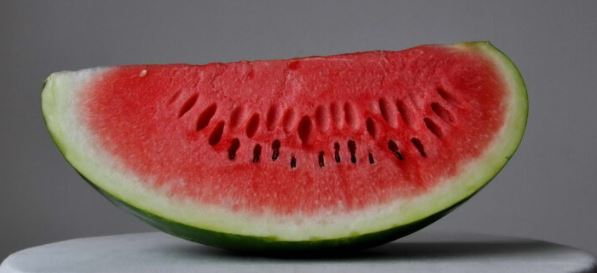
So we’ve established that deer like to eat watermelon, but you may still be wondering: can deer eat watermelon?
Feeding deer watermelon provides them with energy from carbohydrates, digestible fiber, plus the following vitamins and minerals:
- Vitamins A, B5, and C
- Potassium
- Copper
These vitamins and minerals provide deer with many benefits.
For example, vitamin C will help protect deer against scurvy and vitamin assists in deer immune system function.
Potassium is great for deer because it helps maintain good pH balance and aid in proper digestion.
Fat-Soluble Vitamins For Deer
Vitamins A, D, E, K, and calcium are fat-soluble, so they can be stored in the deer’s fat and liver to be used later as needed.
This means that vitamin A content from deer eating watermelon can be “stored up” for later use, which is highly beneficial.
Water-Soluble Vitamins For Deer
Vitamin C, B Vitamins, niacin, folic acid, and potassium are all water-soluble, which means they cannot be stored, so they must be replaced continually.
So a deer that eats watermelon for the vitamin C content must continue to consume foods that contain these necessary vitamins to stay healthy.
Should I Feed Watermelons To Deer?
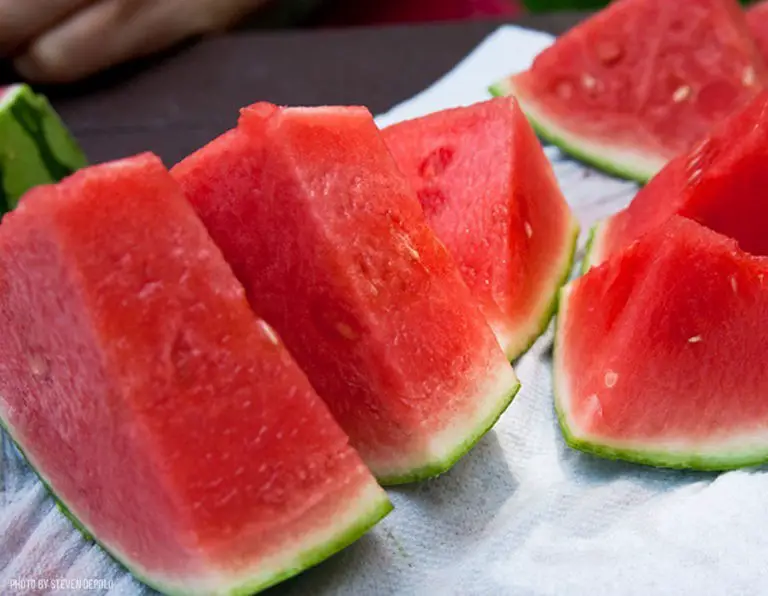
Feeding deer foods like watermelons occasionally is fine, as it is viewed as a rare treat and the deer will really enjoy it!
Feeding wild deer watermelons regularly poses a few problems, however.
Here’s why you shouldn’t feed watermelons to deer.
Deer Need To Rely On Nature For Food
If you feed deer continuously, they may start relying on that food source, which will cause them to stop foraging in nature for foods that they need to survive.
Natural Foods Are Naturally Better For Deer
Feeding deer foods like watermelons can alter their diet significantly, depending on what you’re feeding them, increasing the chance of malnourishment.
Deer Should Have A Healthy Fear Of Humans
Second, it reduces a deer’s natural fear of humans, which can shorten their lifespan or put them in danger.
You May Attract Other (Unwanted) Wildlife
Putting extra food out for deer can also attract predators like coyotes, wolves, or mountain lions to the area, which put the deer (and potentially you) at risk.
You Can Increase The Transmission Of Diseases
If you have lots of deer in your area, think twice about putting out food continuously for them.
If you bring deer together at the same feeding site, it can increase their risk of contracting chronic wasting disease or other communicable diseases from each other.
How To Feed Watermelon To Deer
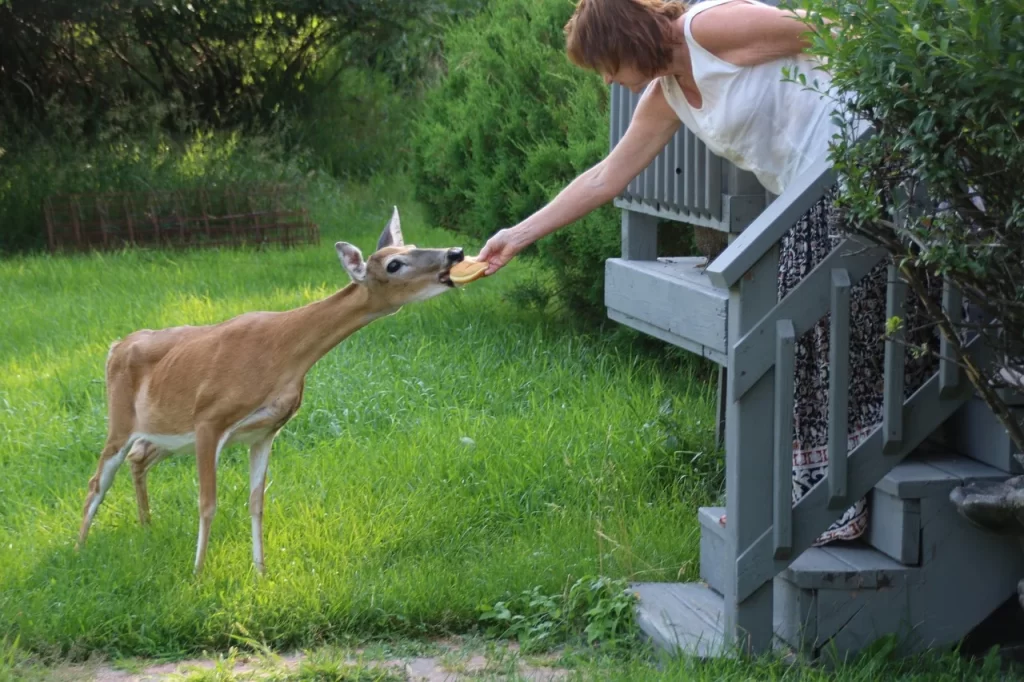
Most gardeners and veggie growers want to keep deer away from their watermelon.
If you have extra watermelon or are looking to see if you can feed watermelon to deer, this next part is for you.
There are a few things to keep in mind when feeding deer watermelon: the size of the portion and your scent.
Make sure to place the watermelon on the ground where they’re visible and can be easily reached by deer.
If you’ve got a garden or field with watermelon growing in it, the deer will eat them right out of the ground.
If deer are not normally around your area in winter, don’t feed them leading up to winter as they will not migrate where and when they should.
This will lead to the deer relying on you as their food source and can result in starvation.
Should I Cut Up Watermelon For Deer To Eat?
Chances are that it’s not worth it for you to cut up watermelon to feed the deer.
You could leave your scent on them, plus the deer’s teeth are designed to be able to eat food that’s best for them.
Watermelons are also soft inside, so it’s not necessary to cut them up for feeding to deer.
Don’t Leave Your Scent On Deer Food
Deer have a keen sense of smell that allows them to smell human scent farther than bloodhounds can, and can smell up to six different scents at once.
Deer won’t eat food like watermelon if they have a strong human scent on them, so you should take care to minimize your trace.
You can do this by rinsing the watermelon and also washing your hands with antimicrobial soap.
Alternatively, you can put a few drops of apple cider vinegar on your hands when handling food you’ll be giving to the deer.
Another easy option is to use gloves when handling watermelon for deer to eat.
Do Deer Eat Watermelon? Wrapping Things Up
So, do deer eat watermelon?
The answer is yes!
Watermelons are like candy to deer, and they’ll gobble up the entire watermelon plant if they can.
Deer will eat different all types of watermelon including home-grown, farm-grown, and wild watermelon.
Fortunately there are many methods you can use and combine to keep deer away from your precious watermelon.
Try a few and see what works best for you.
Have any observations to add to the discussion? Be sure to let us know in the comments below.
Check our our other helpful wildlife guides while you’re here:
- Can deer eat orange peels?
- Do deer eat pumpkins?
- Do deer eat Morel mushrooms?
- Do deer eat blackberries?
- Do deer eat strawberries?
- Do deer eat elderberry?
- Do deer eat pineapple?
- Do deer eat kiwi?
- Can deer eat lemons?
- Do deer eat persimmons?
- Do deer eat cherries?
- Do deer eat apricots?
- Do deer eat nectarines?
- Do deer eat peaches?
- Do deer eat blueberries?
- Do deer eat raspberries?

